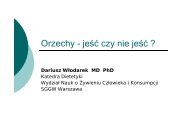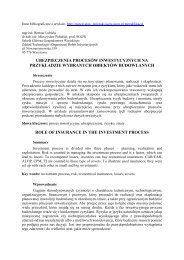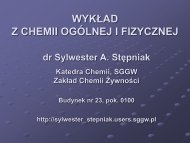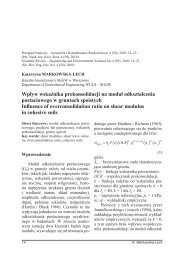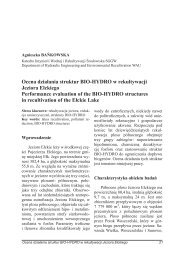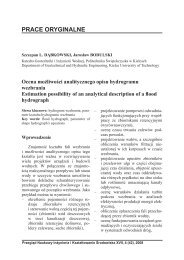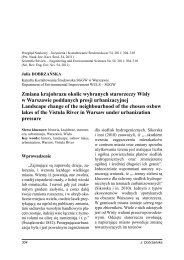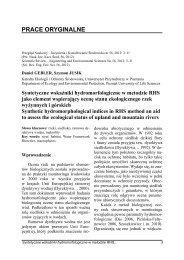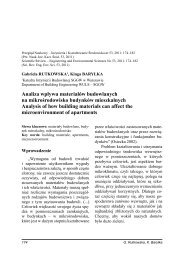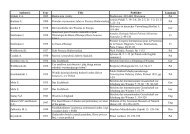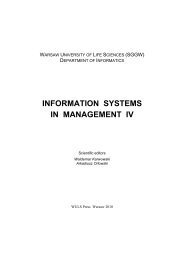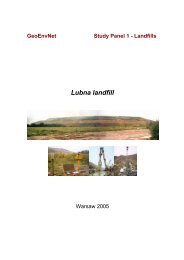ACTA SCIENTIARUM POLONORUM - SGGW
ACTA SCIENTIARUM POLONORUM - SGGW
ACTA SCIENTIARUM POLONORUM - SGGW
Create successful ePaper yourself
Turn your PDF publications into a flip-book with our unique Google optimized e-Paper software.
124 J. WiśniewskaCommon Agricultural Policy (CAP) has been to favour the economic development ofagriculture which aimed to modernise European farming and thereby increase productionto achieve European self-sufficiency in food production. This aim was supported byprice supports and subsidies that also aimed to increase farm incomes relative to otherareas of the economy and took place with little regard for the environment. It is doubtlessthat raising the efficiency creates an opportunity to preserve the social functions and thedevelopment of natural environment, while at the same time, it may result in their degradationand deterioration in capital stock and agricultural land capacity. It is difficult tooppose the thesis that an economic unit, being subject only to market forces and thereforeonly interested in profit maximisation, will not take into account the areas of its operationwhich do not favour its efficiency. Therefore, it is also difficult to oppose the viewthat a sustainable development requires a coordinated and comprehensive approach inplanning and implementing economic policy, with the participation of the whole society[Wiśniewska 2010].The Single European Act, which came into force in 1987, constituted a new legalbasis for Community policy on the environment, and had the following objectives: topreserve, protect and improve the quality of the environment, to contribute towards protectinghuman health, to ensure a prudent and rational utilisation of natural resources TheAct went on to state that: “environmental protection requirements shall be a componentof the Community’s other policies”. The integration of common agricultural and environmentalpolicy is an effect of McSharry’s Reforms of CAP which was introduced in1992 year. The impacts of agriculture and agricultural policies on the environment area major concern in the EU countries, particularly in the context of agricultural policyreform and the achievement of sustainable agriculture. Agricultural policy reform policiesto promote sustainable agriculture and address environmental and natural resourceissues. The basic long-term challenge for agriculture is to produce food and industrialcrops efficiently, profitably and safely, and to meet a growing world demand withoutdegrading natural resources and the environment. While agricultural productivity hasimproved substantially, it has often been accompanied by resource degradation, such assoil erosion and water depletion. Agriculture also contributes positively to the environmentthrough provision of landscapes, wildlife habitats, and as a sink for greenhousegases [Łuczka-Bakuła 2007].The conception of sustainable development in agriculture presented in the paper is,therefore, set on four (not three) dimensions, reflecting the impact of durable developmentof farming. Sustainability of agriculture can be defined as the state of four coinherentsubsystems within which agriculture is operating. They are economic, social,environmental and institutional (Figure 1).The subjective and objective scopes of the activities are implemented within the confinesof state rural areas policy. They are targeted not only at farmers, but at the whole ruralcommunity and labour force, not merely farms, but also capital and natural resources,not just the income from farming, but also the income parity and the standards of livingin farmers’ families. There are different extents aimed by the sustainable policy linked asa feedback (Table 2). As it results from the above examples, all components of eco-developmentremain in mutual relations, creating a dynamic system. Thus, the policy of ruralareas development requires continual discussion and making difficult decisions, often inActa Sci. Pol.



